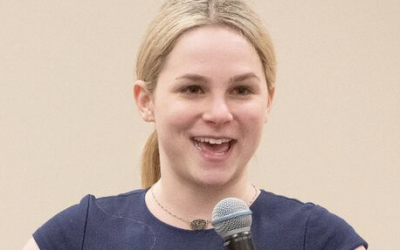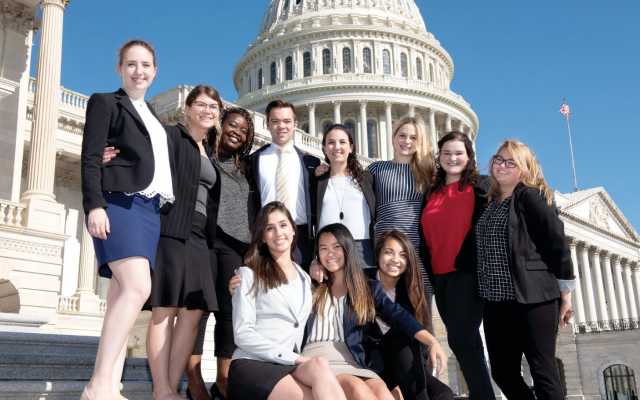A Focus on Counterterrorism and Warfare
University of Michigan student, an Atlanta native, studies complex subjects.
Sarah Moosazadeh is a staff writer for the Atlanta Jewish Times.
The lessons her Israeli father taught her along with her frustration defending her views on the Israel-Palestine conflict are what led Talia Katz to pursue an education in counterterrorism and asymmetric warfare in the Middle East.
The University of Michigan rising senior recently spoke with the AJT about her experience this summer with The Fund for American Studies in Washington D.C. and her internship with the Department of State’s Bureau of Near Eastern Affairs.
The Atlanta native shared some skills she learned from TFAS, the criticism she endures for tackling preconceived notions about Israel, and how counterterrorism and asymmetric warfare have evolved.

“What we see now, especially in the Middle East, is that instead of having nation-states going to war against each other, we have more conventional warfare with non-state actors working both against each other and nation-states,” Katz said regarding asymmetric warfare. “This is a new form of warfare we are seeing on a broader scale, such as Al-Qaeda and ISIS, where they are not nation-states and do not have the same world leaders or borders we are used to.”
As a result, Katz says this has made it difficult for the international community to control these lone wolfs on a humanitarian level as well as strategic one. “Counterterrorism offers different strategies and methods we would employ in order to deter and foil non-state actors who wish to use violence for a political purpose,” she said. But that, too, has become difficult in today’s world, she said.
“I think the biggest challenge is that because these are non-state actors they are not confined to a border. It’s really hard to pinpoint where the threat is coming from and the fact that people can be brought into the terror network from really any corner of the world or wherever terror networks may influence social media or other forms of communication,” Katz said.
Another challenge with counterterrorism is the balance between personal freedoms and privacy, she said. “I think with the advent of technology and how it has become so involved in our lives, terrorist groups are using it to recruit insurgents to execute their plans and I think that is the biggest challenge our government now has to face,” she said.
To help address these obstacles, Katz participated in TFAS, which allowed her to take classes at George Washington University and intern full-time for eight weeks. “What I really liked about the program is that it exposed us to different points of views and taught us how to have respectful and intellectual dialogues, which I find lacking on college campuses today,” Katz said.
Katz was able to apply what she learned at TFAS to her internship at the Department of State’s Bureau of Near Eastern Affairs, which communicates with different democracies around the world.
“I think I developed new work ethic skills and, instead of focusing on getting the job done, I focused more on getting the job done right, because I realized that details do matter, and I was able to parallel that in the classroom as well as the think tank I worked for.”
At Michigan, Katz faced numerous challenges regarding her views on the Israel-Palestine conflict. For a while she tried to play devil’s advocate and rebuff questions from her peers, but she eventually got so frustrated with people’s closemindedness she wrote an article for her school’s newspaper about having more constructive dialogue.
“On one hand that was received as a betrayal by a lot of students, and on another, it was received really well by faculty, and moving forward, it looks like classes are going to be conducive to those types of conversations,” Katz said.
In her freshman year, Katz was taught that Jews invented religious persecution, and she heard anti-Semitic questions such as: Why was she connecting her religion to a terrorist state? “I know that this type of behavior should not be tolerated or accepted, but it became adopted into the environment … and hopefully it will change in the future, but there are layers of anti-Semitism on campus,” she said.
Katz’s father served in the IDF as well as the Lebanon War, and immigrated to the United States after his service. It was his stories, she said, that sparked her interest in the Middle East. By the time she entered high school, Katz became involved in AIPAC, but the Israel-Palestine conflict still left her with many questions she was determined to untangle. Once she got accepted into Michigan’s public policy program, Katz was determined to make counterterrorism and asymmetric warfare her main focus.
In the future, Katz hopes to become a news pundit that comments on international security issues. “I love explaining these complex issues because I spend so much time trying to make it less complex for myself, but I am coming into my senior year and really need to figure out where my niche truly lies.”




comments